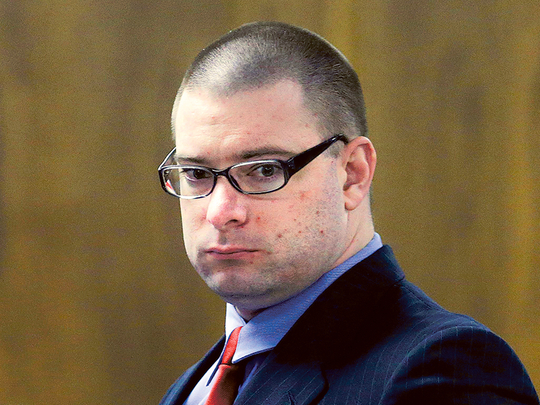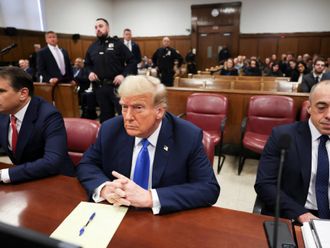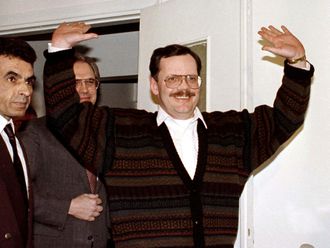
Stephenville, Texas: After a nine-day trial and about 2 1/2 hours of deliberation, a Texas jury convicted a troubled veteran of capital murder late on Tuesday in the slaying of American Sniper author Chris Kyle and another man.
State District Judge Jason Cashon immediately sentenced Eddie Ray Routh, 27, to life without possibility of parole in the fatal shootings of Kyle, 38, and friend Chad Littlefield, 35, during the trio’s trip to an outdoor shooting range on February 2, 2013.
Routh, a former Marine repeatedly hospitalised and treated for mental illness, confessed to the shootings but pleaded not guilty by reason of insanity.
He did not appear to react as the judge read the verdict.
Prosecutors did not seek the death penalty.
Routh’s trial drew attention to thorny questions surrounding post-traumatic stress.
Kyle’s widow, Taya, had left the courtroom during closing arguments and did not return for the verdict, sentencing or victim impact statements, which came late on Tuesday.
In his impact statement, Don Littlefield addressed Routh, telling him about his son’s “quiet nature” and calling him “a good listener” who “gave you his time because he felt you needed it.”
“The state of Texas has decided to spare your life, which is more than you were willing to give Chad,” he said, sobbing.
Littlefield’s brother, Jerry Richardson, also spoke emotionally in his statement in court.
“You took the lives of two heroes, men that tried to be a friend to you, and you became an American disgrace,” Richardson told Routh. “Your claims of PTSD have been an insult to every veteran who served with honour, disgracing a proud military with your cowardice.”
When it was all over, Kyle’s parents, brother and other relatives emerged from court sobbing, and paused in a hallway to hug.
Taya Kyle, 40, had been the state’s first witness. She returned to the gallery on Tuesday, muttering in frustration during defence attorneys’ closing remarks before leaving court.
Earlier in the day, she had stayed as prosecutors displayed graphic crime scene photographs days after she had travelled to Los Angeles for the Oscars, where the movie American Sniper, based on Kyle’s book, won an Academy Award for sound editing. She carried her late husband’s dog tags on the red carpet.
No jurors spoke publicly on Tuesday night.
Outside the courthouse, Littlefield’s mother addressed reporters. “We waited two years for God to get justice for our son,” Judy Littlefield said. “As usual, God has been faithful.”
Defence attorneys said they would appeal.
In closing arguments on Tuesday, prosecutors and defence attorneys had painted drastically different portraits of Routh.
The trial was held where the pair were killed, in rural Erath County, about 100 miles southwest of Dallas.
Routh declined to testify. His defence attorneys had called half a dozen witnesses, including one on Tuesday: a forensic psychiatrist, Dr Mitchell Dunn, who described how the troubled veteran was repeatedly hospitalised and medicated at Department of Veterans Affairs facilities for “psychosis” after his honourable discharge in 2010. Routh’s attorneys reminded jurors that after meeting Routh the day of the shootings, Kyle texted Littlefield on the way to the range to say Routh appeared “nuts.”
Standing in front of a board displaying the requirements to prove insanity under state law, defence attorney Tim Moore asked the jury, “Did we prove to you with the credible weight of the evidence that he was insane at the time? Absolutely.”
Moore noted the “delusional gibberish” Routh spouted to investigators after the shooting, calling Kyle and Littlefield “headhunters” who had been planning to kill him and take his soul.
“He killed those men because he had a delusion,” said fellow defence attorney J. Warren St. John, adding, “He believed in his mind that they were going to kill him.”
Earlier in the trial, Dunn, the psychiatrist, testified for the defence that Routh believed that those trying to kill him were hybrid “pig people.”
But prosecutors asserted that from the day of the shootings forward, Routh only pretended to be insane the day of the shootings after he was caught by police while fleeing in the truck he stole from Kyle.
They called more than two dozen witnesses to tell the story of how before the shootings he had exaggerated his military record and post-traumatic stress, drank and used marijuana heavily and threatened to shoot himself and others.
When he fled the range the day of the shootings, drunk and high, Routh drove about 100 miles to the Dallas area to pick up his dog, and stopped at a Taco Bell for two burritos before heading for Oklahoma — proof he was thinking clearly, prosecutors said.
“Crazy don’t run,” said one of the prosecutors, Assistant Atty. Gen. Jane Starnes.
Starnes said the jury would recognise the “preposterous pig-man, hybrid-pig story” that Routh later told a psychiatrist to be “a load of hogwash.”
Earlier on Tuesday, a ballistics expert testified that the bodies of Littlefield and Kyle were both found with their guns holstered, the safeties on. Littlefield was shot seven times, Kyle six times.
“That is not insanity; that is just cold, calculated, capital murder,” Starnes said.
The jury also heard a recorded conversation on Tuesday that Routh had with a New Yorker magazine reporter from jail in which he admitted to the killings, said he was “riled up” and had to “take care of business.”
“His words have no meaning because they change depending on whether he’s talking to a police officer, a reporter or a psychiatrist he needs to convince you to let him off the hook,” Erath County Dist. Atty. Alan Nash said at the end of closing remarks, for which each side was granted an hour.
“He’s gone to the well, the deep well of excuses for his violent behaviour, and it’s time for it to stop,” Nash said. “Find him guilty.”
One of Routh’s three defence attorneys gestured to the packed gallery, noting the unusually extensive media coverage and public interest. He urged the jurors to ignore the buzz surrounding the case and to base their verdict on the evidence.
“You be steadfast in what you believe,” St. John said. “Do not be swayed in what others want you to do.”












